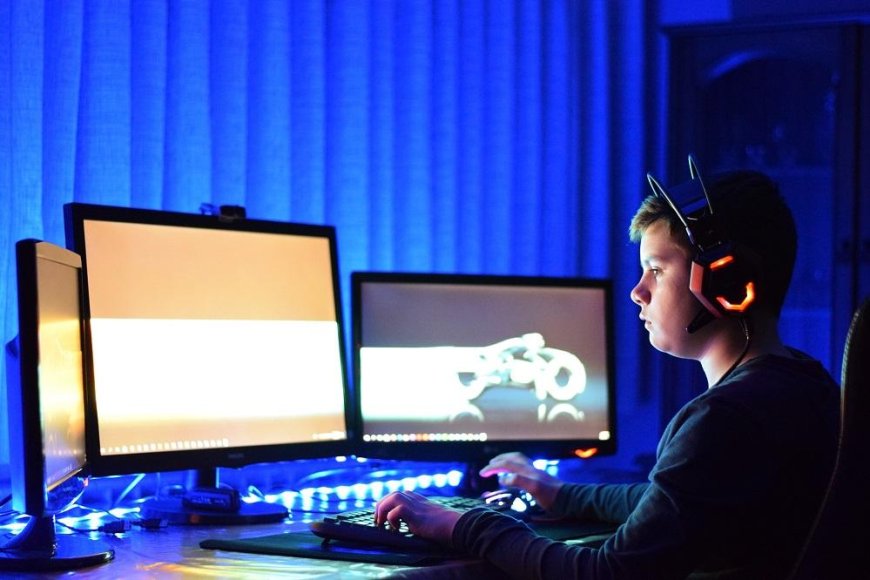Screens overstimulate children and change their mood
today are hyperactive, irritable and apathetic due to the constant use of new technologies. Screens overstimulate children and

Many parents keep their children entertained with screens, even if they overstimulate them. Many children today are hyperactive, irritable and apathetic due to the constant use of new technologies. Screens overstimulate children and change their mood.
Most people know that screens overstimulate children and make them gloomy, nervous and even quarrelsome. However, many parents often overlook how intensive use of these technologies makes their little ones more lethargic.
This is especially true in primary and lower secondary school classes. High irritability is almost the order of the day in some of these children, most of whom also have other kinds of emotional problems.
It also manifests itself in their low ability to perform school tasks and limitations in assimilating information, creative reasoning and solving simple problems.
Some say today's parents are raising the most apathetic generation in history. There are exceptions, however, as many teens are even more concerned about the environment and other social causes than adults.
However, from a psychological and clinical point of view, we are all witnessing children between the ages of 9 and 15 suffer from anxiety, sleep disorders, and depressive or bipolar disorders. Some point out that behind these conditions there is an effect of the intensive and inadequate use of new technologies.
The screens overstimulate children and make them fluffier
The data is striking to say the least. According to Common Sense Media, nearly half of children under the age of eight have their own tablet and spend an average of 2.5 hours a day on it.
However, the American Academy of Pediatrics states that children between the ages of two and eight should not spend more than an hour in front of a screen a day, always with an adult with them and never at mealtimes.
But children under the age of three use these devices daily as entertainment. This is the age when social and manual interactions are key. Nevertheless, some parents allow their little ones to become lonely "digital natives" at an age when their child's brain needs other stimuli the most.
New technologies are not a problem in themselves, as long as they are put to good use, as they are powerful allies of knowledge. The problem, however, is how much time the children spend with them.
Must Read: The Tetris Effect: Does Playing Games Affect Your Brain?
Researcher found that children spend more than three hours a day on their cell phones or tablets. The screens, however, overstimulate children and make them irritable.
Mood disturbance and intensive use of screens
More children than ever are diagnosed with attention deficit disorder (with or without hyperactivity), anxiety disorders, major depression and even bipolar disorder. However, most of these conditions disappear as babies undergo "digital fasting".
In other words, mood disturbance disappears when the use of electronic screens is reduced or completely eliminated. This hyperactivity of the brain associated with heavy screen use therefore has a profound effect on behavior and mood.
Research such as that conducted at the University of Pennsylvania also supports this relationship. The aforementioned study revealed that spending more than an hour in front of the screen a day from an early age to adolescence affects mental well-being.
As a result, children are less curious and composed, have trouble regulating their emotions, and don't know how to socialize.
Screens overstimulate children and affect their sleep
Children should sleep longer than adults. However, many children find it difficult to fall asleep and, as a result, do not get a good and lasting rest all night long.
What is the cause of this problem? Well, the trigger is light from electronic devices. It is these substances that overactivate the brain, reducing the release of melatonin and causing serious hormonal imbalances.
As you can see, screens over-stimulate children and make them more irritable, lethargic, slow-reacting, and unmotivated.
Mobile phones and tablets drain the brain's energy
Children, especially teenagers, live immersed in a digital universe that grabs all their attention. In addition, their entire cognitive and visual concentration is activated 100% when exposed to stimuli from screens of electronic devices. Thus, their mental level is minimal as they return to the real world.
The intensive use of mobile phones and tablets absorbs all the attention and energy of young people. This way, they no longer have the motivation or incentive to do their homework. Or going outside to play when they leave the threshold of digital technology and turn off their devices.
Children addicted to screens
The screens overstimulate children and turn them into adrenaline addicts. What does it mean? Does this mean, for example, that a six-, seven- or twelve-year-old can actually be "addicted"?
To understand this relationship, you need to understand that online games, as well as platforms like TikTok, release dopamine in the brains of young people.
Feeling of well-being and entertainment is addictive. Consequently, they need more and more exposure hours for the same stimulus to produce the same level of pleasure. As you can imagine, they fall into a state of withdrawal, constant irritability, frustration and anger when they don't feel "dopamine".
The most problematic thing is that we bring up children who no longer understand their free time without screens of electronic devices. They become people who filter their reality through technology and push aside direct socialization in the real and immediate world.
In conclusion, while new technologies are great tools, they only work in your favor when you use them properly.
